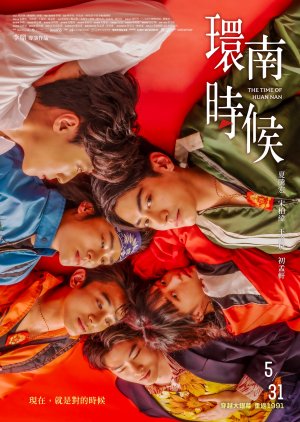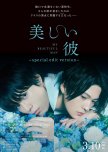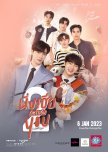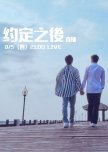
A Movie that captivates the soul
This left such an incredibly deep impression on me that even now, as I reminisce and try to write a review, I have tears in my eyes. I've watched the film several times and will probably never get enough. It’s a beautifully heartfelt film with outstanding performances from everyone. When I first watched it, I was left with an intense and beautiful feeling about life, friendship, love, and the moment. I thought to myself that each of us has our own "Isle of Capri song" moment, one in which we’d like to stay forever, where we feel alive, strong, and happy. And even though it's not possible—or maybe precisely because it’s not possible—we should deeply cherish every such moment that comes our way. We should live it, not hesitate, maybe even take risks. That same moment will never return.The creators play with time here—from the perspective of time travel, aging, waiting for love—allowing the viewer to think and feel. Love is beautiful, crazy, patient, painful, and cruel, but above all, eternal. It can endure through time, transcend illness, and heal the soul. It can be the only thing that keeps a person going. All the relationships in this film are so real and well-developed. How difficult it must have been to love someone of the same gender in 1991, or how hard it must have been to wait for your love for 31 years. Just as a son who can't understand his aging father, who is slipping away from reality, but with knowledge of the past, suddenly truly understand and love him. (The scene of the son bathing his father in 2022 is probably my absolute favorite, as is the ending itself).
I was completely absorbed by it in every way—whether by the beautiful scenes, the theme of time travel, the cast, the costumes, or the music. I don’t categorize this film as BL, or a gay film, or even an Asian film; it belongs in the general category of all films and has become one of my absolute favorites. It is my wish for this film to reach as many viewers as possible. It’s true that not everyone may understand it, or not on the first viewing, but the creators made it in such a way that we cannot say who understands it and who doesn’t. Everyone can perceive it in their own way; everyone can see something different in it, or a different detail may matter to them. It can evoke different questions and answers in each person—or perhaps leave them unanswered—but emotionally, I believe most people will agree that it touches the soul. It is unique and exceptional. And I wouldn’t hesitate for a moment to recommend it to absolutely everyone.
Esta resenha foi útil para você?

Absolutely amazing movie
After the first viewing, I was surprised by the scope of the story, which I could not understand, and the absolutely perfect performances of the actors. Further, the story was sifted inside me, the individual scenes penetrated more and more deeply into my soul. The creators set the viewer in the mood with this exceptional piece so that it is not immediately clear and the story can be imagined from different angles. Yao Hua (a long-haired and headdressed symposia) is working at a butcher's stall in the market in 2022, his father is already a bit deranged, and suddenly Yao finds himself 31 years back in 1991, where he is mistaken for the missing Yong Hui-e and in the group of four friends he is especially interested in the only girl Kang Min, he sees a younger version of his father Bao Ding and finds out that the father is gay and in love with An Jian. I had tears in my eyes at some parts of the movie. The time (1991) in which Yao Hua finds himself is not as welcoming and open as the year 2022, in this year the first democratic changes are just beginning in Taiwan and the Kuomintang was abolished, and this time is excellently portrayed in the film. I also liked that all the characters are not gay like we sometimes see in Thai dramas, and that made everything more natural. Taiwan is a concept not only in the world of BL, and it is so, at least for me, here as well... The film needs to be watched at least two or three times. Excellent music.The ending is not translated, about 58 subtitles, so we got a spoken word translation from a Slovak lady living in Taipei, who translated the ending into Czech (Czech and Slovak languages are very similar and they understand each other).
Esta resenha foi útil para você?

needed to be expanded into a miniseries, or else rewritten into a tighter narrative.
This film is extremely pretty to look at - and I'm not just referring to the rugby thighs of actor Chu Meng-hsuan! But amazing visuals are just about all the film did for me. So I cannot recommend it, unfortunately. Below, I will discuss the major formal aspects in the same order that I started noticing them while watching the film:Filming: amazing!! and very, very red.
The cinematography is stylish and gorgeous here. Lighting and colors are dramatic in a way that reminds me of Mag Hsu's 2018 Taiwanese film "Dear Ex" (btw, if you were thinking of watching "The Time of Huannan" but haven't seen "Dear Ex" yet, go watch "Dear Ex" right this second! it's such a good film.). Shot composition is occasionally stunning, especially when neon lights are involved.
Soundtrack: ugh.
The musical soundtrack is way too busy, in a way that reminds me of some Asian drama series. I recognize that busy soundtracks are really a matter of personal taste, and to be fair the film does embrace silence in some sections - I just wish it leaned into that more! Anyways, with everything going on in it, the soundtrack also never actually manages to build a substantial contribution to the mood of the film. This is at least partly because of the specific song choices (which I felt were really mismatched to the film, but perhaps that's also a matter of personal taste): the musical styles of the songs are so different that they don't stand together, because nothing else in the film ties them together. It felt like the director couldn't figure out how to tell a story using music, and he also couldn't figure out how to select music to match the visual+emotional journey of the film. As a result of these problems, the soundtrack was a very annoying and intrusive experience for me.
Narrative: uh-oh...
The film has a number of narrative problems because the director/writers tried to squeeze too many stories and threads into the film. For example, one of the queer characters discloses being sexually assaulted, and then that emotional bomb is totally ignored for the rest of the film; such trivial treatment of that topic makes it feel like the film is (hopefully unintentionally) doing a spectacle of queer pain from the perspective of the heterosexual protagonist - a spectacle which is even more one-note than the harshness of Liu Kuang-hui's 2020 Taiwanese film "Your Name Engraved Herein". Because the narrative tries to do too many things with its four main leads, the characterization ends up rather shallow and flimsy. Even though the film is already on the longer end for conventional cinema, with a runtime of 2.25 hours, there just wasn't enough time to develop the characters enough to make me connect with them before the story tried to get an emotional payoff. For most of the film I felt very little sense of interiority in the characters, and not enough understanding of who the characters were to help me empathize with their motivations for their behaviors. The film ends by indulging in melodramatic sentimentality (complete with flashback montages in the style of mass-market Asian dramas) which felt cloying to me because the necessary emotional weight was not properly established beforehand in the characterization, and because of all the plot contrivances made to justify the ending.
Editing: meh.
The problem with this film is that its pacing is driven by a flawed narrative. Unfortunately, the pacing holds back the high-level composition of the film: different scenes are edited together in a way that never really works for me. The result didn't give me a sense of cinematic rhythm comparable to the rhythm of different shots within each scene, and I didn't really feel a sense of temporal coherence. Because of this, the film felt more like a dream of free-association jumps between different moments than the continuous narrative demanded by the plot; this wouldn't have been a bad thing if the film had been constructed specifically for such a structure (e.g. if the time travel had been via dreaming rather than a handwaved science-fictional mechanism). Alternatively, this wouldn't have been a thing at all if the film had instead been constructed as an episodic miniseries.
Missed opportunity 1: a miniseries.
Imagine if the story had been given more room to breathe as a drama series. Then we could've spent time with each character to learn about their background, their hopes and dreams, their worries and struggles. And flashbacks would have actually felt temporally significant. These are all strengths of the 2023 k-drama "Twinkling Watermelon" - and its story also happens to be a "young adult travels back in time and learns about his father as a young adult and encounters barriers to changing history" plot with an ensemble of four main characters. So maybe you should watch that series instead of this film.
Missed opportunity 2: a tighter film.
Or imagine if the story had been simplified in the direction of minimalism. Then we could've spent much more time with the striking cinematography, lingering on gorgeous and thoughtfully-designed shots as the actors traveled through time and space. If we slowed down pacing all the way into the extreme of slow cinema, then the director could even have deleted all the songs from the soundtrack and come out with a better film. A big part of the artistic quality of the slow-cinema films of Taiwanese director Tsai Ming-liang - which only have the absolute minimum bare bones of a plot - is that they give their shots plenty of room to breathe in order to reshape our experience of time; the striking visuals drive the pacing of those films, in the process showing us deeper truths about the characters. Tsai makes films with powerful imagery instead of strong storytelling, because of what he's good at (e.g. he said, "The storyline might be plain, but it is meant to carry the power of imagery, so as to reveal the essence of cinema. [...] I never thought of myself to be a good storyteller. Therefore, I chose to be otherwise.", in a talk which has been translated at the Senses of Cinema blog); "The Time of Huannan"'s director could probably have made this film good with powerful imagery, instead of trying and failing to tell a good story. But even stopping far short of slow cinema by keeping a more textured story could've yielded a truly great film - perhaps something like "Dear Ex", which has a more relatable, complex, and emotionally moving narrative than "The Time of Huannan" (and also one about a guy learning more about his father! go watch "Dear Ex" instead of this film!) while also being significantly shorter.
Conclusion: a hollow apple.
Because the film lacks a solid core to drive its visual polish, it's like what Scott McCloud describes in his book "Understanding Comics" as a hollow apple: art which has a shiny surface but is empty inside.
Esta resenha foi útil para você?

The time travel makes the film unique among other recent Taiwanese LGBT productions
Who has not ever dreamed of taking a walk through the gladiator era in the Roman Colosseum or playing chess with Napoleon Bonaparte? As long as mobile phones do not incorporate the function of taking leaps through History – something impossible and unusual, at least for the moment –, there is always the option of dreaming thanks to cinema.For as long as we have been aware of it, the passage of time and its nature have fascinated humanity. Particularly in cinema, time travel and temporal paradoxes have proven to be a resource that, well used, has given rise to truly fascinating films, from well-established classics like 'Back to the Future' to recent gems like 'The Time of Huan Nan', a romantic Taiwanese LGBT+ adventure directed by Leading Lee ('Anywhere, Somewhere, Nowhere', 2014).
Starring Hsia Teng Hung, Wang Yu Ping, Edison Song and Chu Meng Hsuan, the film evokes other notable Taiwanese films, while exploring LGBT+ relationships, family relationships, parents' refusal to accept their children's homosexuality and the market traditional Huan Nan, with a history of 55 years, located in the Monga delta, bathed by the Tamsui River and the Xindian River, in the Mongka district of Taipei.
Inspired by true events, field research and production took more than three years and the film is a strong collaborative project with various departments of the Taipei City government. It was filmed on location in the district and cast many local market vendors.
Although the supreme objective of the film is to represent this historic place where thousands of inhabitants of the island capital converge daily, 'The Time of Huan Nan' is more than the sum of its parts and is a moving work.
Epic, intimate, and with intense colors, 'The Time of Huan Nan' reminded me of 'Les 7 Vies de Léa', a French series released by Netflix in 2022, and which also takes us back 30 years to 1991, but in This case involves teenagers. Something like this happens in the Taiwanese film, although not as complicated.
The film revolves around Chen Yao Hua (Hsia Teng Hung), a daring high school student who in the year 2022, in the midst of the Covid-19 pandemic, works in the historic market at the family butcher stall. While filming with his cell phone his father, Chen Bao Ding, who in the middle of a depression dances on the roof of the market with a sword, Chen is suddenly transported 31 years ago, to 1991, when his father was young.
The film shows that from this roof you can see the best panoramic night views of all of Taipei.
Mistaken for Liu Yong Hui, a missing high school student (which is why he will be called by that name from then on), Chen Yao Hua unexpectedly enters the circle of three inseparable friends: the young version of his own father (Edison Song), An Jiang Chang (Chu Meng Hsuan), her father's lover, and Yu Kang Ming (Wang Yu Ping), the only female member of the close-knit group of friends and who plays an important role in bonding the four gang members
From the first moments, Chen Yao Hua, who has traveled back in time to trace his father's history and discover why he suffers from depression, falls in love with Yu Kang Ming, but neither of them know how to deal with the other's attraction, and, in turn, discovers that his father is homosexual and has a secret relationship with Chang An Jian.
In this way, in this vibrant and vigorous scene converted into another character, these three homoeroticly filmed handsome men, and the charming girl, take the oath as the "Four Young Brothers of Huan Nan" They hang out at the market and flirt with each other while exploring life's possibilities.
Well filmed and with an outstanding rhythm, the film tells us how the four characters jump between 1991 and 2022, while they experience the changes in their lives and how their passions, desires and regrets develop over just over three decades; and how they can make changes to redeem the losses and pain they endured all that time.
All this against the backdrop of a time that is not tolerant for LGBT+ people in Taiwan, and in which the lives of the four friends will eventually be destroyed.
Full of warmth, sensuality and love, in this sense, 'The Time of Huan Nan' joins the list of Taiwanese films that explore homosexual relationships from martial law to today, as is the case with 'Your Name Engraved Herein', by Kuang-Hui Liu (2020), or 'Girlfriend Boyfriend', by Yang Ye Che (2012).
Likewise, like this last film, or 'Eternal Summer', by director Leste Chen (2006), 'The Time of Huan Nan' presents the dynamics of a love triangle between a heterosexual woman and two homosexual men.
Likewise, 'The Time of Huan Nan' evokes other Taiwanese films, while in its final stages it makes visual references to 'The River', by Tsai Ming-liang, while the dynamic between the four protagonists is reminiscent of 'Mongka', the film by 2010 year by filmmaker Doze Niu, including queer subtext. In this way, these two productions share the environment, taking as their setting that historic district of the Taiwanese capital, considered the oldest neighborhood in the city.
Likewise, the intimate bath that Chen Yao Hua gives to Chen Bao Ding reminds me of the bath, in which perhaps strangely because they are father and son the homoerotic aspect is more than hinted at, the one given by Ah Jie (Roy Chiu) to Zheng Yuan (Spark Chen), in 'Dear Ex', the film directed by Taiwanese Mag Hsu.
However, the time travel narrative makes 'The Time of Huan Nan' unique among other recent Taiwanese LGBT films, and its stylistic flair makes it superior to recent hits like 'Marry My Dead Body'.
This won't be the only bathing scene. This will not be the only intimate and homoerotic moment: the three men will enjoy themselves in a public bathroom, and in it the two young lovers will clean their bodies with soap and water under the curious gaze of Chen Ya Hua. Because yes, in 'The Time of Huan Nan' there will be no sex scenes, not even a shy kiss, but there are many dazzling close-ups of beautiful male faces, torsos and buttocks, and intimate close-ups and sexy players behind a ball in a rugby match
Beyond the good editing, the beautiful photography and an exciting and stimulating story full of convincing performances in which the four protagonists carry the weight of the film, with a powerful mix of charisma and excellent chemistry between them, 'The Time of Huan Nan' also seems like a movie that couldn't have been filmed anywhere in Asia except Taiwan.
The most obvious sign of this is its direct representation of LGBT+ characters and themes. While other Asian countries make films of this genre and theme, they are generally not for general consumption.
In just three months since its premiere on July 13, 2024 at the New York Asian Film Festival (NYAFF), 'The Time of Huan Nan' has become a very popular film. This perhaps reflects Taiwan's continuing reputation as the most tolerant place towards LGBT people in East Asia. Although the advances or setbacks in terms of the rights of LGBT+ people may be conditioned by who are the politicians who govern at the level of the entire Island as well as in each district, and impediments that threaten the lives of homosexuals, such as that a gay couple can adopt a child and the impossibility of having property rights and hereditary rights, the widespread success of this film validates and further increases Taiwanese tolerance towards people from that community.
Even the performances of the secondary characters, such as Chen Yao-hua and Chang An-jian's parents, are good, despite their small roles.
The flaws of 'The Time of Huan Nan' are mainly narrative. Chen Yao Hua is perhaps too indifferent to the many new discoveries about his father. Likewise, the film may not stick to its premise, with the time travel plot losing steam towards the end once Chen Yao Hua returns to the present, and is now seen to have been missing for thirty years.
It is dark and complicated to say the least. Especially when he has to worry about an unfolding tragedy: Chang An Jian's disappearance thirty years ago, so he must return to the past once again. But this is not a world in which the future traveler can alter events while traveling through time.
On the other hand, already in the endings, an overly didactic and explanatory section is introduced about the Huan Nan market and the Mongka district, which breaks with the tone and dynamics of the film.
Esta resenha foi útil para você?






![[BL/gay/LGBTQ+] movies & short movies](https://i.mydramalist.com/kmL7O_4t.jpg)
![[BL/gay/LGBTQ+] movies & short movies](https://i.mydramalist.com/eVm48t.jpg)
![[BL/gay/LGBTQ+] movies & short movies](https://i.mydramalist.com/gZZ0Ot.jpg)
![[BL/gay/LGBTQ+] movies & short movies](https://i.mydramalist.com/7r3YBt.jpg)
![[BL/gay/LGBTQ+] movies & short movies](https://i.mydramalist.com/kDBwv_4t.jpg)

























